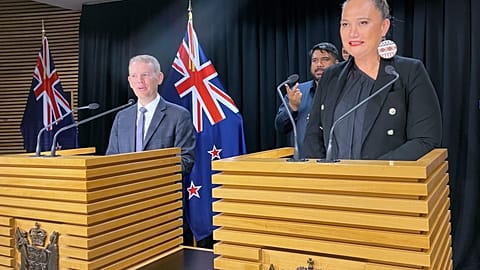An annually rising legal smoking age aims to prevent the next generation from ever being able to buy cigarettes.
New Zealand has passed into law a unique plan to phase out tobacco smoking for the next generation by imposing a lifetime ban on young people buying cigarettes.
 ADVERTISEMENT
ADVERTISEMENT
 ADVERTISEMENT
ADVERTISEMENT
The law states that tobacco can't ever be sold to anybody born on or after January 1, 2009 - and from now on, the minimum age for buying cigarettes will keep going up and up.
In theory, somebody trying to buy a pack of cigarettes 50 years from now would need ID to show they were at least 63 years old. But health authorities hope smoking will fade away well before then. They have a stated goal of making New Zealand smoke-free by 2025.
"There is no good reason to allow a product to be sold that kills half the people that use it," Associate Minister of Health Dr. Ayesha Verrall told lawmakers in Parliament. "And I can tell you that we will end this in the future, as we pass this legislation".
New Zealand is not the only nation pushing to ban smoking for the next generations. In June, a report commissioned by the UK government recommended raising the legal smoking age each year to phase out tobacco use among young people.
Denmark also unveiled similar plans earlier this year, but the government said such a move would require changes to the EU's Tobacco Products Directive. A citizens' initiative later petitioned the European Commission to ban the sale of tobacco and nicotine products to EU citizens born after 2010.
According to the latest data from Eurostat, 18.4 per cent of people aged 15 and over in the EU smoke every day. But the figure ranges from 6.4 per cent in Sweden to 23.6 per cent in Greece and 28.7 per cent in Bulgaria.
Plain packaging, tax hikes, and smoking bans
New Zealand already restricts cigarette sales to those aged 18 and over, requires tobacco packs to come with graphic health warnings and cigarettes to be sold in standardised packs.
The country in recent years also imposed a series of hefty tax hikes on cigarettes.
Verrall said the new law would create generational change, while the health system would save billions from not needing to treat illnesses caused by smoking, such as cancer, heart attacks, and strokes.
Tobacco kills up to half of its users - resulting in more than 8 million deaths each year, according to the World Health Organization (WHO), which has long called for measures such as advertising bans, plain packaging, and higher taxes on tobacco products to discourage smoking.
The past two decades have also seen smoking bands expand across many countries in enclosed public places, on public transport, in offices, and also public parks and beaches.
'Nanny-state prohibition'
Lawmakers in New Zealand voted along party lines in passing the legislation 76 to 43.
The libertarian ACT party, which opposed the bill, said many small corner stores, known in the country as dairies, would go out of business because they would no longer be able to sell cigarettes.
"We stand opposed to this bill because it's a bad bill and its bad policy, it's that straightforward and simple," said Brooke van Velden, ACT’s deputy leader. "There won't be better outcomes for New Zealanders".
She said the gradual ban amounted to "nanny-state prohibition" that would end up creating a large black market. She said prohibition never worked and always ended with unintended consequences.
Vaping not affected
The new law also reduces the number of retailers allowed to sell tobacco from about 6,000 to 600 and decreases the amount of nicotine allowed in tobacco that is smoked.
It does not affect vaping, which has already become more popular than smoking in New Zealand.
Statistics New Zealand reported last month that 8 per cent of New Zealand adults smoked daily, down from 16 per cent ten years ago. Meanwhile, 8.3 per cent of adults vaped daily, up from less than 1 per cent six years ago.
Smoking rates remain higher among Indigenous Māori, with about 20 per cent reporting they smoked.
The law change was welcomed by several health agencies. Health Coalition Aotearoa said the new law represented the culmination of decades of hard-fought advocacy by health and community organisations.

















